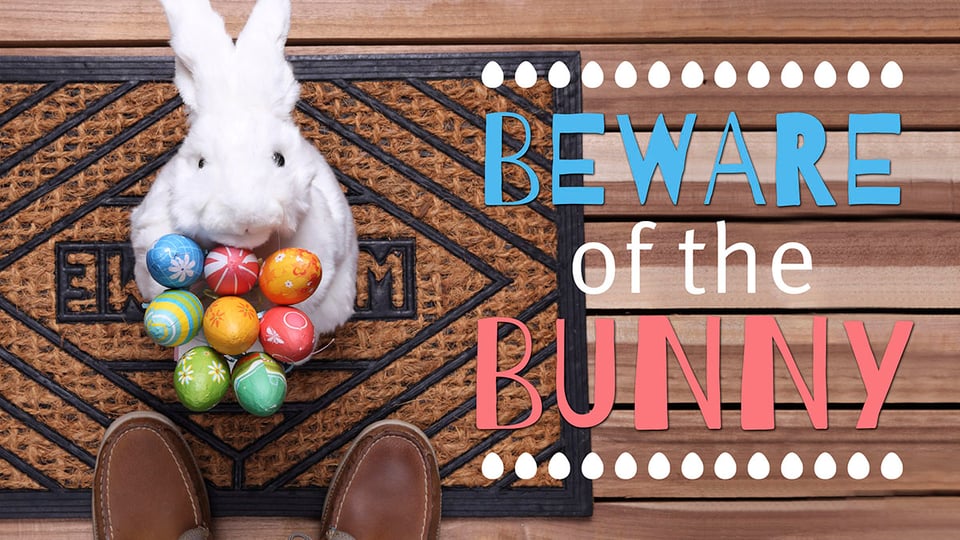Beware of the Bunny: The Dark Origins of Easter’s Symbols
What’s with all the Easter bunnies and Easter eggs? Do they obscure the meaning of Jesus Christ’s resurrection—or worse?

This morning I saw a bunny hopping across the road—missing an oncoming car by inches! I was actually cheering for the bunny. I guess you could say I like bunnies as much as the next guy.
So why the headline, “Beware of the Bunny!”? Because I saw other bunnies on my run this morning that gave me pause to think. With Easter coming up, several houses are adorned with decorations of rabbits and eggs. One had a rabbit—and a cross.
What are all the little kids to make of it? The Easter Bunny, the Easter egg hunt and all the Easter candy would probably not teach them much about Jesus Christ or His resurrection. And as kids who have watched Veggie Tales cartoons know, it’s not good to set up large statues of rabbits or bow down to bunnies.
The origin of the Easter Bunny
Where did the Easter Bunny come from? Checking an encyclopedia or doing a web search, you will find information like this (from a Christian website):
“The origin of the Easter Bunny has roots that go back to pre-Christian, Anglo-Saxon history. The holiday was originally a pagan celebration that worshipped the goddess Eastre. She was the goddess of fertility and springtime and her earthly symbol was the rabbit.
“Thus the pre-Christian Anglo-Saxons worshipped the rabbit believing it to be Eastre’s earthly incarnation.
“When the Anglo-Saxons were converted to Christianity, the pagan holiday, which occurred around the same time as the Christian memorial of Jesus’ resurrection from the dead, was combined with the Christian celebration and given the name Easter.
Christians who look to the Bible as their ultimate authority find that the New Testament Church didn’t celebrate Easter but continued to celebrate Passover and the Feast of Unleavened Bread.
“Originally, there were some very pagan practices that went along with the Easter celebration.”
When ancient Israel entered the Promised Land, God warned them not to seek after the teachings and traditions of the nations that once inhabited the land.
He said, “Take heed to yourself that you are not ensnared to follow them, after they are destroyed from before you, and that you do not inquire after their gods, saying, ‘How did these nations serve their gods? I also will do likewise.’ You shall not worship the LORD your God in that way; for every abomination to the LORD which He hates they have done to their gods” (Deuteronomy 12:30-32).
Later, Christ told His disciples: “Well did Isaiah prophesy of you hypocrites, as it is written: ‘This people honors Me with their lips, but their heart is far from Me. And in vain they worship Me, teaching as doctrines the commandments of men.’ For laying aside the commandment of God, you hold the tradition of men” (Mark 7:6-8).
That’s why Christ’s followers avoid religious celebrations that have pagan origins, no matter what the intent or long-standing tradition. (For more on this, see “Origin of Easter.”)
And it turns out not just the trappings, but the timing of Good Friday and Easter is wrong. For the details, including an easy-to-read and helpful chart, see “Sign of Jonah: Did Jesus Die Good Friday, Rise on Easter?”
(Hint, try counting three days and three nights between Friday afternoon and Sunday morning (Matthew 12:39-40). I don’t think Jesus got this wrong.)
Christians who don’t celebrate Easter
Christians who look to the Bible as their ultimate authority find that the New Testament Church didn’t celebrate Easter but continued to celebrate Passover and the Feast of Unleavened Bread.
Consider Paul’s clear statement to the mainly gentile congregation in Corinth: “Therefore purge out the old leaven, that you may be a new lump, since you truly are unleavened. For indeed Christ, our Passover, was sacrificed for us. Therefore let us keep the feast, not with old leaven, nor with the leaven of malice and wickedness, but with the unleavened bread of sincerity and truth” (1 Corinthians 5:7-8).
If Paul told the Greek Christians to celebrate the Passover and Feast of Unleavened Bread decades after Christ’s crucifixion and resurrection, why shouldn’t we do it today?
The Bible or the bunny? I say, choose the Bible.
Date Posted: April 16, 2025



